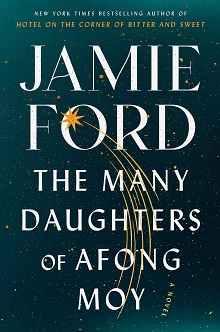The Many Daughters of Afong Moy
COPY ISBN
 Ford (Love and Other Consolation Prizes) writes a fictional, multigenerational account of the women in a Chinese American family. Each chapter is dedicated to one of the seven Moys, from Afong Moy (the first Chinese woman to arrive in the U.S., in 1834), to Dorothy Moy in 2045 and Annabel Moy in 2086. Shared familial trauma is the women’s heirloom, proving the basis of the book—that trauma can be inherited and transmitted. Readers are introduced to 14-year-old Afong whose ah ma is preparing her to be wedded to Dei Yu, who has just passed away. As Afong’s ah ma teaches her the way for a wife to mourn, the author drives home the point: “They both knew she did not need a lesson in grief. She had been born a woman.” Two centuries later, Dorothy attempts to break free from the cycle of carrying her predecessors’ pain, by participating in an experimental epigenetic therapy. Throughout the novel, Ford (who is a man) acutely captures the plight of women across time. Dorothy is the most developed character, but each of the Moy women will leave readers wanting to know more.
Ford (Love and Other Consolation Prizes) writes a fictional, multigenerational account of the women in a Chinese American family. Each chapter is dedicated to one of the seven Moys, from Afong Moy (the first Chinese woman to arrive in the U.S., in 1834), to Dorothy Moy in 2045 and Annabel Moy in 2086. Shared familial trauma is the women’s heirloom, proving the basis of the book—that trauma can be inherited and transmitted. Readers are introduced to 14-year-old Afong whose ah ma is preparing her to be wedded to Dei Yu, who has just passed away. As Afong’s ah ma teaches her the way for a wife to mourn, the author drives home the point: “They both knew she did not need a lesson in grief. She had been born a woman.” Two centuries later, Dorothy attempts to break free from the cycle of carrying her predecessors’ pain, by participating in an experimental epigenetic therapy. Throughout the novel, Ford (who is a man) acutely captures the plight of women across time. Dorothy is the most developed character, but each of the Moy women will leave readers wanting to know more.
CORRECTION: Due to an editing mistake, the original version of this review gave an incorrect title for one of Ford’s previous works. (His previous novels include 2017’s Love and Other Consolation Prizes and 2013’s Songs of Willow Frost.) LJ regrets the error.
VERDICT Ford’s tragically beautiful book will make readers cry and smile.
2 COMMENTS
undefined says
Thank you!
undefined says
Thank you so much!
Comment Policy:
- Be respectful, and do not attack the author, people mentioned in the article, or other commenters. Take on the idea, not the messenger.
- Don't use obscene, profane, or vulgar language.
- Stay on point. Comments that stray from the topic at hand may be deleted.
- Comments may be republished in print, online, or other forms of media.
- If you see something objectionable, please let us know. Once a comment has been flagged, a staff member will investigate.

Joyce Homan
Thank you so much!
Posted : 2022-04-11 20:21:03

Yenny Gomes
Thank you!
Posted : 2022-03-09 18:51:57
ALREADY A SUBSCRIBER? LOG IN
We are currently offering this content for free. Sign up now to activate your personal profile, where you can save articles for future viewing



